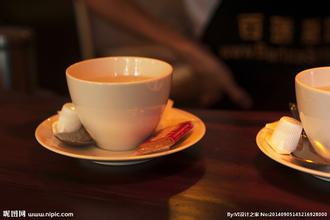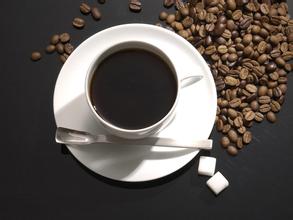Introduction to the flavor and taste characteristics of Jamaican coffee manor with spicy and fragrant flavor
In 1717 King Louis XV of France ordered coffee to be grown in Jamaica for twenty years.
Blue Mountain Coffee
Blue Mountain Coffee (6 photos)
In the mid-19th century, Sir Nicholas Lawes, Governor General of Jamaica, imported Arabica seeds from Martinique and began planting them in St. Andrew. To this day, St. Andrew's is one of the top three growing regions for Blue Mountain coffee in Jamaica, along with Portland and St. Thomas. Within eight years, Jamaica exported more than 375 tons of pure coffee. In 1932, coffee production peaked, harvesting more than 15000 tons of coffee. Blue Mountain coffee is the most superior coffee in the world. The weather, geological structure and terrain of Jamaica provide the ideal place. Ridges running through Jamaica extend to the east of the island, and the Blue Mountains rise to more than 2100 meters. The weather is cool, foggy and frequent, so use this rich soil to reconcile rain. Here, coffee trees are grown in a mixed cropping system, alongside banana and avocado trees on terraces. Some small farms are also planted. But even the region's largest planters are small-scale farmers by international standards, many of them smallholders whose families have been working for two centuries. The coffee industry in Jamaica faces a number of problems, such as the impact of hurricanes, increased labour costs and difficulties in mechanising terraces. Many small estates and farms are difficult to rationalize planting. From the above, we can understand the general production situation of Blue Mountain coffee. It should be noted that 99.9% of the Blue Mountain coffee that can be drunk in China is only planted near the Blue Mountain Mountains. Only the coffee produced in the 6000 hectares above 1600 meters above sea level can be called Blue Mountain, and the output has always been below 900 tons. According to the principle of 10% supply to the whole world outside Japan, Is this coffee, which the world consumes only 90 tons a year, something that can be drunk at any cafe for a few dozen yuan?
Blue Mountain Coffee is undoubtedly one of the best coffees. While price can guarantee an adequate supply of Blue Mountain coffee, it does not guarantee the coffee has the best flavor. Also, this coffee tastes a lot more expensive than it looks. To taste its best flavor, the coffee beans should be added more than other coffees, otherwise the flavor will be a little inconsistent, so the flavor lies in adding 10% to 15% more coffee beans than the coffee with the price lower than it. Blue Mountain Coffee can maintain its excellent status today, which is inseparable from local business policies. In 1932, Jamaica reduced the island's dependence on sugar exports by encouraging coffee production. The local government did not grow a large number of high-quality coffee in order to increase production value, as most coffee-producing countries did. Instead, it preferred quality to be superior, preferring to sacrifice production and ensure quality. Therefore, Jamaica is one of the countries in the world that produces less coffee. Brazil, the world's largest coffee exporter, produces 30 million bags of coffee a year, while Blue Mountain produces only about 40,000 bags a year.
There is rarely a single true Blue Mountain coffee bean in the "Blue Mountain" coffee market. There is a "Jamaica Blue Mountain Blend" coffee that is a blend of 30 percent Blue Mountain coffee and 70 percent of the finest Jamaica alpine coffee. [1]Both of these coffees attempt to mimic Blue Mountain coffee, but fail to achieve perfection.
Blue Mountain coffee in the United States by "cold reception," and American habits. Since the 1970s, flavored coffee has gradually become a favorite. It is to add spices to coffee beans, or to add coffee partners to brewed coffee, flavoring coffee up to hundreds of kinds. Flavoured coffee is mostly made from cheaper coffee beans. Maxwell's coffee costs $3 a pound, while Blue Mountain coffee costs $80 a pound.

Important Notice :
前街咖啡 FrontStreet Coffee has moved to new addredd:
FrontStreet Coffee Address: 315,Donghua East Road,GuangZhou
Tel:020 38364473
- Prev

Introduction of Panamanian Kasha coffee with moderate malic acid flavor and taste of boutique coffee in manor area
When it comes to coffee prices, we should pay great attention to a manor in Panama, and it can even be said that so far, no other single estate has had such an impact on coffee farming in Central America. This is Esmeralda Manor, which belongs to and is run by the Peterson family. Coffee was first brought by European settlers in the 19th century.
- Next

Introduction to the characteristics and Flavor of Ethiopian Coffee Manor with Mocha refreshing Flavor
Ethiopian coffee beans grow in close to the natural environment, after years of planting under the same growth conditions, Ethiopian coffee beans have gradually adapted to the environment here. More than 60% of coffee beans are grown in forests or semi-forests. Large-scale coffee-growing villages account for about 35% of the country's total coffee production. Many of these are used.
Related
- Detailed explanation of Jadeite planting Land in Panamanian Jadeite Manor introduction to the grading system of Jadeite competitive bidding, Red bid, Green bid and Rose Summer
- Story of Coffee planting in Brenka region of Costa Rica Stonehenge Manor anaerobic heavy honey treatment of flavor mouth
- What's on the barrel of Blue Mountain Coffee beans?
- Can American coffee also pull flowers? How to use hot American style to pull out a good-looking pattern?
- Can you make a cold extract with coffee beans? What is the right proportion for cold-extracted coffee formula?
- Indonesian PWN Gold Mandrine Coffee Origin Features Flavor How to Chong? Mandolin coffee is American.
- A brief introduction to the flavor characteristics of Brazilian yellow bourbon coffee beans
- What is the effect of different water quality on the flavor of cold-extracted coffee? What kind of water is best for brewing coffee?
- Why do you think of Rose Summer whenever you mention Panamanian coffee?
- Introduction to the characteristics of authentic blue mountain coffee bean producing areas? What is the CIB Coffee Authority in Jamaica?

